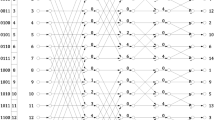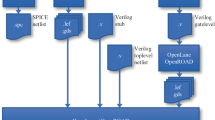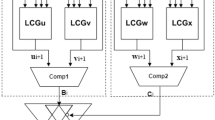Abstract
In ultra-high sampling rates, FFT is widely used for acoustic emission signals. In this manuscript, the effectual architecture of hardware is presented based on the execution of FFT due to radix-2 frequency decimation algorithm (R2DIF) and channeled method that allows data to be effectively shared through storage by shift registers. An optimal rotation method/design uses the modified digital coordinate rotation computer algorithm (m-CORDIC) as well as Radix- 2r depending on coding scheme to replace complex multiplier as FFT. The m-CORDIC algorithm enhances computing confluence, while Radix-2r allows the logarithmic reduction of the adder steps. The suggested design does not need large blocks of memory used to maintain the factor as twiddle. Experimental outcomes displays the presented design performs the existing methods by achieving high accuracy and throughput. Compared to the CSD as well as DBNS, novel radix-2r encoding desires an average of 23.12% and 3.07% fewer additions, respectively. The expansion of CSD is canonical signed-digit.


















Similar content being viewed by others
References
H. Abdoli, H. Nikmehr, N. Movahedinia, F. de Dinechin, Improving energy efficiency of OFDM using adaptive precision reconfigurable FFT. Circuits Syst. Signal Process. 36, 2742–2766 (2016)
H. Abdoli, H. Nikmehr, A flexible CO-OFDM using reconfigurable multi-precision FFT. IEEE Commun. Lett. 21, 1997–2000 (2017)
S. Aggarwal, P. Meher, K. Khare, Concept, design, and implementation of reconfigurable CORDIC. IEEE Trans. Very Large Scale Integr. (VLSI) Syst. 24, 1588–1592 (2016)
R Andraka A survey of CORDIC algorithms for FPGA based computers. in Proceedings of the 1998 ACM/SIGDA sixth international symposium on Field programmable gate arrays 1998 pp. 191–200
M. Bahtat, S. Belkouch, P. Elleaume, P. Le Gall, Instruction scheduling heuristic for an efficient FFT in VLIW processors with balanced resource usage. EURASIP J. Adv. Signal Process. 2016(1), 38 (2016)
S. Bhairannawar, S. Sarkar, K. Raja, K. Venugopal, Implementation of fingerprint based biometric system using optimized 5/3 DWT architecture and modified CORDIC based FFT. Circuits Syst. Signal Process. 37, 342–366 (2017)
J. Bruno, V. Almenar, J. Valls, FPGA implementation of a 10 GS/s variable-length FFT for OFDM-based optical communication systems. Microprocess. Microsyst. 64, 195–204 (2019)
J. Chen, Y. Lei, Y. Peng, T. He, Z. Deng, Configurable floating-point FFT accelerator on FPGA based multiple-rotation CORDIC. Chin. J. Electron. 25, 1063–1070 (2016)
J.W. Cooley, J.W. Tukey, An algorithm for the machine calculation of complex Fourier series. Math. Comput. 19(90), 297–301 (1965)
M. Garrido, M. López-Vallejo, S. Chen, Guest editorial: special section on fast fourier transform (FFT) hardware implementations. J. Signal Process. Syst. 90, 1581–1582 (2018)
M. Garrido, M. Sanchez, M. Lopez-Vallejo, J. Grajal, A 4096-point radix-4 memory-based FFT using DSP slices. IEEE Trans. Very Large Scale Integr. (VLSI) Syst. 25, 375–379 (2017)
C. Ingemarsson, O. Gustafsson, SFF—the single-stream FPGA-optimized feed forward FFT hardware architecture. J. Signal Process. Syst. 90, 1583–1592 (2018)
B. Jammu, P. Pati, S. Patra, K. Mahapatra, FPGA implementation of rule optimization for stand-alone tunable fuzzy logic controller using GA. Complex Intell. Syst. 2, 83–98 (2016)
V. Kitsakis, K. Nakos, D. Reisis, N. Vlassopoulos, Parallel memory accessing for FFT architectures. J. Signal Process. Syst. 90, 1593–1607 (2018)
A. Liacha, A. Oudjida, F. Ferguene, M. Bakiri, M. Berrandjia, Design of high-speed, low-power, and area-efficient FIR filters. IET Circuits Devices Syst. 12, 1–11 (2018)
R. Lin, G. Liu, W. Tang, FPGA implementation of ultrasonic s-scan coordinate conversion based on radix-4 CORDIC algorithm. Int. J. Eng. Technol. 7, 249–253 (2015)
Y.W. Lin, H.Y. Liu, C.Y. Lee, A 1-GS/s FFT/IFFT processor for UWB applications. IEEE J. Solid-State Circuits 40, 1726–1735 (2005)
V. Muttillo, G. Valente, F. Federici, L. Pomante, M. Faccio, C. Tieri, S. Ferri, A design methodology for soft-core platforms on FPGA with SMP Linux, OpenMP support, and distributed hardware profiling system. EURASIP J. Embed. Syst. 2016(1), 15 (2017)
N. Nguyen, S. Khan, C. Kim, J. Kim, A high-performance, resource-efficient, reconfigurable parallel-pipelined FFT processor for FPGA platforms. Microprocess. Microsyst. 60, 96–106 (2018)
T. Ono, H. Suzuki, Y. Yamanashi, N. Yoshikawa, Design and implementation of an SFQ-based single-chip FFT processor. IEEE Trans. Appl. Supercond. 27, 1–5 (2017)
A. Oudjida, A. Liacha, M. Bakiri, N. Chaillet, Multiple constant multiplication algorithm for high-speed and low-power design. IEEE Trans. Circuits Syst. II Express Briefs 63, 176–180 (2016)
Y. Parmar, K. Sridharan, Precomputation-based radix-4 CORDIC for approximate rotations and Hough transform. IET Circuits Devices Syst. 12(413–423), 27 (2018)
R. Rathore, N. Kaur, Comparison study of DIT and DIF radix-2 FFT algorithm. Int. J. Comput. Appl. 150, 25–28 (2016)
A. Rauf, M. Pasha, S. Masud, Towards design and automation of a scalable split-radix FFT processor for high throughput applications. Microprocess. Microsyst. 65, 148–157 (2019)
M. Rihani, M. Mroue, J. Prévotet, F. Nouvel, Y. Mohanna, ARM-FPGA-based platform for reconfigurable wireless communication systems using partial reconfiguration. EURASIP J. Embed. Syst. 2017(1), 35 (2017)
V. Soumya, R. Shirodkar, A. Prathiba, Bhaaskaran V. Kanchana, Design and implementation of a generic CORDIC processor and its application as a waveform generator. Indian J. Sci. Technol. 8(19), 2015 (2015)
Y. Tian, Y. Hei, Z. Liu, Q. Shen, Z. Di, T. Chen, A modified signal flow graph and corresponding conflict-free strategy for memory-based FFT processor design. IEEE Trans. Circuits Syst. II Express Briefs 66, 106–110 (2019)
J.E. Volder, The birth of CORDIC. J. VLSI Signal Process. Syst. Signal Image Video Technol. 25, 101–105 (2000)
M. Wang, Z. Li, An area- and energy-efficient hybrid architecture for floating-point FFT computations. Microprocess. Microsyst. 65, 14–22 (2019)
Z. Wang, X. Liu, B. He, F. Yu, A combined SDC-SDF architecture for normal I/O pipelined radix-2 FFT. IEEE Trans. Very Large Scale Integr. Syst. 23, 973–977 (2015)
H. Xiao, X. Yin, N. Wu, X. Chen, J. Li, X. Chen, VLSI design of low-cost and high-precision fixed-point reconfigurable FFT processors. IET Comput. Digital Tech. 12, 105–110 (2018)
Funding
No funding received
Author information
Authors and Affiliations
Corresponding author
Ethics declarations
Conflict of interest
Authors declare that they have no conflict of interest
Additional information
Publisher's Note
Springer Nature remains neutral with regard to jurisdictional claims in published maps and institutional affiliations.
Appendix
Rights and permissions
About this article
Cite this article
Kavitha, M.S., Rangarajan, P. An Efficient FPGA Architecture for Reconfigurable FFT Processor Incorporating an Integration of an Improved CORDIC and Radix-2r Algorithm. Circuits Syst Signal Process 39, 5801–5829 (2020). https://doi.org/10.1007/s00034-020-01436-4
Received:
Revised:
Accepted:
Published:
Issue Date:
DOI: https://doi.org/10.1007/s00034-020-01436-4




